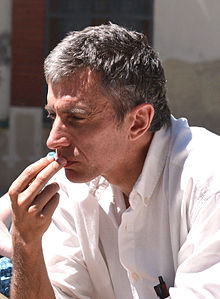Jordi Pigem
Jordi Pigem | |
|---|---|
 Jordi Pigem, 2013 | |
| Born | April 30, 1964 |
| Nationality | Español |
| Alma mater | University of Barcelona (Ph.D, 1998) |
| Era | Contemporary philosophy |
| Region | Western philosophy |
| School | Continental philosophy |
Main interests | Philosophy of science, ecology, economics, sociology |
Jordi Pigem (born April 30, 1964) is a Catalan philosopher and writer.
Career
[edit]Pigem holds a Ph.D in Philosophy from the University of Barcelona (1998). He coordinated the ecology journal Integral between 1989 and 1992. From 1998 to 2003 he was a lecturer and coordinator of the Philosophy module for the Masters in Holistic Science at Schumacher College (in partnership with University of Plymouth) in Dartington, United Kingdom. In 1999 he won the Philosophy Award of the Institute of Catalan Studies with the dissertation El pensament de Raimon Panikkar: Una filosofia de la interdependència (Raimon Panikkar’s Thought: A Philosophy of Interdependence), and in 2006 he was awarded the Resurgence and Scientific and Medical Network Essay Award.
His latest book is "Inteligencia vital. Una vision postmaterialista de la vida y la conciencia"/ " Vital intelligence. A postmaterialistic view of life and consciousness" ( Kairos, 2016) .[1] He is a contributor to periodical publications in English, Spanish and Catalan, such as the Cultura/s supplement of La Vanguardia, Agenda Viva [2] (Félix Rodríguez de la Fuente Foundation), Namaste,[3] Resurgence and Tikkun.[4] He has written about the major figures of holistic or systemic thinking, such as Leonardo da Vinci,[5] E. F. Schumacher, Fritjof Capra[6] or Ivan Illich.[7]
In October 2016, he receives the XXV Joan Maragall Award for his essay Àngels i robots. La interioritat humana en la societat hipertecnològica, a la llum de Guardini, Panikkar i l’Encíclica Laudato Si' (Angels and Robots. Human interiority in a hyper-technological society, by Guardini's light, Panikkar and the Encyclical Laudato Si'; here in spanish), awarded by the Joan Maragall Foundation.[8]
Bibliography
[edit]- (Coord.) Nueva conciencia : plenitud personal y equilibrio planetario para el siglo XXI (Integral, 1991)[9]
- La odisea de occidente : modernidad y ecosofía (Kairós, 1994)[10]
- El pensament de Raimon Panikkar: interdependència, pluralisme, interculturalitat (IEC, 2007)[11]
- (Ed.) El somriure diví (Icaria, 2008)[12]
- Ivan Illich. Textos escollits. (Tres i Quatre, 2009)[7]
- Buena crisis: Hacia un mundo postmaterialista (Kairós, 2009)[1]
- GPS (global personal social). Valores para un mundo en transformación. (Kairós, 2011)[13]
- La nueva realidad. Del economicismo a la conciencia cuántica. (Kairós, 2013)[14]
- Inteligencia vital. Una visión postmaterialista de la vida y la conciencia. (Kairós, 2016)[15]
- Àngels i robots. La interioritat humana en la societat hipertecnològica. (Viena Edicions, 2017)[16]
- Ángeles o robots. La interioridad humana en la sociedad hipertecnológica. (Fragmenta Editorial, 2018)[17]
- Pandemia y posverdad. La vida, la conciencia y la Cuarta Revolución Industrial. (Fragmenta Editorial, 2021)[18]
- Técnica y totalitarismo. Digitalización, deshumanización y los anillos del poder global' (Fragmenta Editorial, 2023)[19]
References
[edit]- ^ a b Buena crisis: Hacia un mundo postmaterialista. Prólogo de Álex Rovira Celma. Kairós. 2009. p. 190. ISBN 978-84-7245-729-4.
{{cite book}}: CS1 maint: others (link) - ^ "Información de consumo responsable, Agenda Viva Digital". Archived from the original on 2010-02-07. Retrieved 2010-01-16.
- ^ "www.namasteweb.com". Archived from the original on 2005-10-25. Retrieved 2010-01-16.
- ^ "Waking Up from Denial". Tikkun Magazine. Archived from the original on 2010-01-07. Retrieved 2010-01-16.
- ^ "La ciència de Leonardo da Vinci". Mètode. 61. Universitat de València: 16–19. 2009. ISSN 1133-3987.
- ^ "Entrevista a Fritjof Capra". Mètode. 61. Universitat de València: 20–22. 2009. ISSN 1133-3987.
- ^ a b Jordi pigem, ed. (2009). Ivan Illich. Textos escollits. Tres i Quatre S.L. i Institut del Territori. p. 144. ISBN 978-84-7502-822-4.
- ^ "Jordi PIGEM guanyador del XXV Premi Joan Maragall"
- ^
Nueva conciencia : plenitud personal y equilibrio planetario para el siglo XXI. (Coord.). Barcelona Integral D.L. 1991. ISBN 84-7245-290-5.
{{cite book}}: CS1 maint: others (link) - ^ La odisea de occidente : modernidad y ecosofía. Kairós. 1994. ISBN 84-7245-290-5.
- ^ El pensament de Raimon Panikkar: interdependència, pluralisme, interculturalitat. Institut d'Estudis Catalans. 2007. p. 296. ISBN 978-84-7283-903-8.
- ^ Pigem, Jordi; Torradeflot, Francesc, eds. (2008). El somriure diví : acudits : hinduisme, budaisme, judaisme, cristianisme, islam, fe bahai, ateisme. Unescocat. Icaria. ISBN 978-84-7426-989-5.
- ^ GPS (global personal social). Valores para un mundo en transformación. Kairós. 2011. p. 176. ISBN 978-84-7245-896-3.
- ^ La nueva realidad. Del economicismo a la conciencia cuántica. Kairós. 2013. p. 232. ISBN 978-84-9988-229-1.
- ^ Inteligencia vital. Una visión postmaterialista de la vida y la conciencia. Kairós. 2016. p. 192. ISBN 978-84-9988-492-9.
- ^ Àngels i robots. La interioritat humana en la societat hipertecnològica. Viena Edicions. 2017. p. 168. ISBN 978-84-8330-931-5.
- ^ Pigem, Jordi (2018). Ángeles o robots : la interioridad humana en la sociedad hipertecnológica. Barcelona: Fragmenta. ISBN 9788415518860. OCLC 1059530517.
- ^ Pigem, Jordi (2021). Pandemia y posverdad. La vida, la consciencia y la Cuarta Revolución Industrial. Barcelona: Fragmenta. ISBN 9788417796587.
- ^ Pigem, Jordi (2022). Técnica y totalitarismo. Digitalización, deshumanización y los anillos del poder global. Barcelona: Fragmenta. ISBN 9788417796792.
